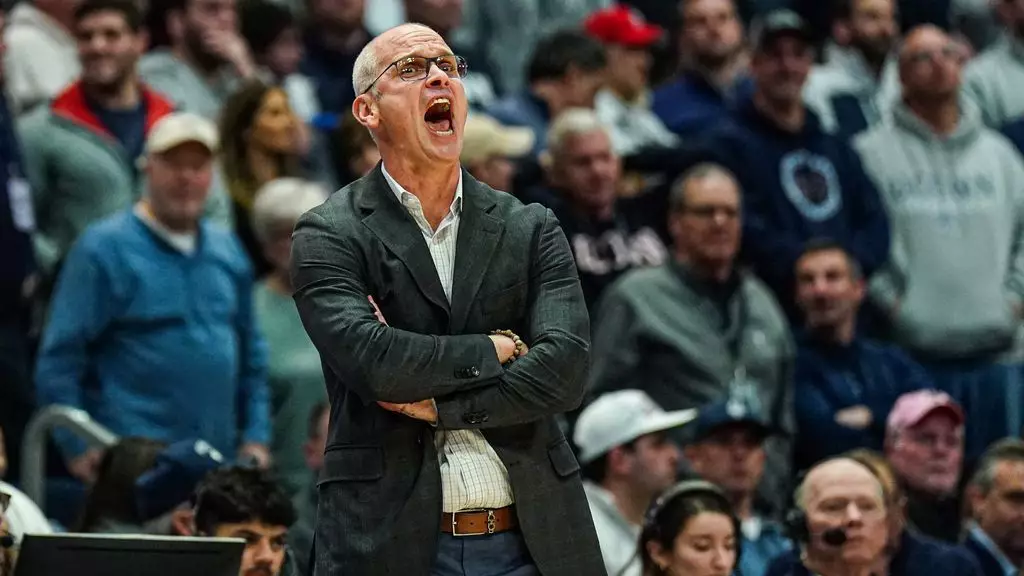In the world of collegiate sports, particularly in basketball, the weight of expectation can become an unbearable burden. UConn’s Dan Hurley has, over the last few seasons, led his team to remarkable heights, and with that success comes a proverbial magnifying glass. The recent fallout from his profane remarks following the Huskies’ heartbreaking loss to Florida exposes not just his emotional volatility but the pressures that accompany maintaining a strong sports program. This incident isn’t merely about an emotional coach; it raises questions about the culture behind competitive college sports and how constraining it can be for those at the helm.
In his moment of frustration, Hurley resorted to profanity regarding the officiating, catching widespread media attention. Unfortunately, such actions can overshadow the accomplishments made by the team and place an unflattering focus on the coach’s conduct. But let’s be honest: is it truly a surprise that emotions run high in the heat of the moment? The hunger for victory can lead even the most composed figures to act out of character, turning a regrettable comment into a national headline.
Media Management or Mismanaged Moments?
The aftermath of Hurley’s comments reveals another layer of complexity concerning the relationship between athletes, coaches, and media. It’s unsettling to witness how quickly a moment can spiral, especially when someone is recording. That a director of basketball communications felt compelled to intervene adds a troubling dynamic to the discussion.
Bobby Mullen’s attempt to have the video removed demonstrates a protective instinct towards Hurley but also raises alarms about the protocol in addressing media interactions. It’s almost as if there’s an unwritten rule that can lead to misguided attempts at damage control. Shouldn’t transparency and accountability be encouraged over defensive actions? The emotional environment after a loss can lead to erratic behavior, but wouldn’t it be more commendable to stand by the coach’s expressions instead of quickly resorting to media scrubbing?
Authenticity vs. Expectations
What makes Hurley’s emotional outburst so compelling is the authenticity shining through his raw reaction. Yes, he regrets the phrasing and acknowledges the quality of the referees, but isn’t that level of emotional engagement vital for sports? In a culture increasingly driven by performance metrics and PR management, Hurley’s outburst unintentionally challenges the idea of how we wish our coaches to display their humanity.
Why must we sanitize the passion inherent in competitive sports? If college coaches were always congenial and polite, what would that communicate to the players under their leadership? The boundaries of acceptable expression often come into question here, and Hurley’s moment of outcry demonstrates just how fragile those boundaries can be. His recognition of the bad timing of his remarks doesn’t strip away the foundation of commitment and care he has built around his team.
The Ripple Effect of Regret
Regret is a powerful emotion, one that Hurley grapples with as he reflects on his actions. He recognizes that the fallout wasn’t isolated to his personal feelings but extended to others involved as well. Hurley’s admission that he set events in motion that led to Mullen facing undue scrutiny is particularly revealing. The collective fabric of a sports program is often woven tightly; one faux pas can unravel broader narratives of teamwork and resilience.
As these events unfold, the ripple effect becomes ever more apparent. Not only does the team’s focus shift from its gameplay to off-court drama, but it also emphasizes how fragile reputations can be in the fast-paced world of athletics. Therefore, when coaches have emotional lapses, the entire system suffers. Thus emerges the question: can we afford to suppress the fervor of coaching for the sake of public image?
A Call for Compassionate Accountability
Ultimately, Hurley’s experiences highlight a crucial need for a shift in how we perceive accountability in high-pressure situations. Instead of vilifying coaches for emotional outbursts, there exists an opportunity for dialogue about balancing passion and professionalism. Mistakes are inevitable, particularly in emotionally charged environments, and perhaps what should be demanded is not perfection but a keen sense of growth and improvement.
This moment serves as an invitation for not only Hurley but all coaches to harness their emotional investments into teachable moments, both for themselves and their players. campus sports culture should embrace the humanity in athletes and coaches alike, creating a holistic environment where performance, emotion, and accountability can coexist. Instead of damning Hurley, how about we learn from his journey?


Leave a Reply